Recording on a Budget
Recording on a Budget
How to Make Great Audio Recordings
Without Breaking the Bank
Brent Edstrom


Oxford University Press, Inc., publishes works that further
Oxford Universitys objective of excellence
in research, scholarship, and education.
Oxford New York
Auckland Cape Town Dar es Salaam Hong Kong Karachi
Kuala Lumpur Madrid Melbourne Mexico City Nairobi
New Delhi Shanghai Taipei Toronto
With offices in
Argentina Austria Brazil Chile Czech Republic France Greece
Guatemala Hungary Italy Japan Poland Portugal Singapore
South Korea Switzerland Thailand Turkey Ukraine Vietnam
Copyright 2011 by Oxford University Press, Inc.
Published by Oxford University Press, Inc.
198 Madison Avenue, New York, New York 10016
www.oup.com
Oxford is a registered trademark of Oxford University Press.
All rights reserved. No part of this publication may be reproduced,
stored in a retrieval system, or transmitted, in any form or by any means,
electronic, mechanical, photocopying, recording, or otherwise,
without the prior permission of Oxford University Press.
Library of Congress Cataloging-in-Publication Data
Edstrom, Brent.
Recording on a budget: how to make great audio recordings without breaking the bank / Brent Edstrom.
p. cm.
Includes bibliographical references and index.
ISBN 978-0-19-539041-4; 978-0-19-539042-1 (pbk.)
1. SoundRecording and reproducingDigital techniquesAmateurs manuals. 2. Sound studiosAmateurs manuals.
I. Title.
TK7881.4.E28 2010
621.3893dc22 2010000169
Recorded audio examples (marked in text with  ) are available online at www.oup.com/us/recordingonabudget
) are available online at www.oup.com/us/recordingonabudget
Access with username Music4 and password Book2497
For more information on Oxford Web Music, visit www.oxfordwebmusic.com
9 8 7 6 5 4 3 2 1
Printed in the United States of America
on acid-free paper
This book is dedicated to my son, Evan.
Acknowledgments
I am grateful to Norm Hirschy, Editor, Music Books, Oxford University Press, for his support of this project. I also appreciate the assistance of Dr. Bruce Frazier, Carol Grotnes Belk Endowed Chair at Western Carolina University, and his students in testing a variety of microphones and preamps in the Center for Applied Technology studio. The many audio excerpts that resulted from that research are an invaluable addition to the book. Many students and professionals participated in recording sessions at my home studio and to these individuals I express my sincere appreciation. I am grateful to Carole Berglie, copyeditor, and Liz Smith, Production Editor, for their excellent work in preparing the manuscript for publication. Finally, I am indebted to my wife for her work in photographing many of the illustrations and her assistance and support in the preparation of this manuscript.
Contents
About the Companion Web Site
www.oup.com/us/recordingonabudget
O xford has created a password-protected Web site to accompany Recording on a Budget. The site features over 240 audio excerpts that demonstrate concepts from the book including microphone placement, audio processing, active listening, and mixing and mastering. Many categories of instruments and ensembles are represented by the recordings.
The online excerpts provide an essential dimension to the book and readers are encouraged to listen to the recordings in conjunction with chapter readings in order to assimilate the concepts from both a conceptual and an aural perspective.
Throughout the text, online examples are indicated with Oxfords  symbol.
symbol.
Introduction
I n 2008, I gave a presentation on the topic of audio recording at the International Association for Jazz Education convention in Toronto. My goal for the session was to talk, musician-to-musician, about the process of recording and to discuss the types of equipment that are required to record music. The topic seemed to resonate with many of the attendees, and over the next few weeks, I received a number of e-mails from fellow musicians and educators who were in attendance at the session. It was clear that many musicians share an interest in recording but lack the technical background to know where to begin. It was also evident that questions concerning the cost and selection of recording equipment prevent many musicians from exploring this rewarding aspect of the music-making process.
This book is not a technical book geared to audio professionalsit is written by a musician and is geared to other musicians, songwriters, composers, band and choir directors, hobbyists, educators, and anyone else who has a desire to learn about recording from a practical and budget-conscious perspective. While technical knowledge is always an advantage, my intent is to focus on the concepts that will help you record better music. The recording arts is a complex subject that requires a unique blend of technical knowledge and artistic acumen, but recording need not be a black art relegated to individuals with a degree in audio engineering. With a basic technical knowledge, an understanding of the recording process, and a few tools, it is possible to make good recordings. That is not to say that you will never need to hire a recording or mastering engineeras with all facets of music there are times where it makes sense to utilize the skills of someone with appropriate experience. However, in many cases, you will be able to do the work yourself and you will find that the development of skills in the recording arts is an immensely satisfying experience that can be enriching on both a professional and an artistic level.
From a professional standpoint, there are innumerable benefits to the development of skills in the recording arts. The industry is competitive and recordings are the primary calling card that enables musicians to find work, so musicians who can produce a quality recording will be at a distinct advantage. In many cases, budget constraints, timelines, or location may limit access to a professional studio. For example, although I live in a fairly large city, there is not a single studio that owns a grand piano. This has been true in other locations as well, so practically speaking, it was essential for me to learn about recording in order to maintain my professional career, as it would be impractical to drive hundreds of miles just to record a demo or mix a commercial project.
Perhaps the biggest benefit in developing a knowledge of recording comes in the form of artistic freedom. Home recording provides the opportunity to work whenever the muse strikes, and knowledge of recording concepts is useful when working with audio professionals. For example, many years ago I recorded a trio album at a name studio in Seattle. Unfortunately, the young engineer did not have a background in trio music, and I was disappointed with the results of the session. In hindsight, knowledge of recording concepts would have helped me to communicate my artistic goals in a more proactive way as the session unfolded.
Knowledge of concepts such as microphone placement and signal processing is also useful in the realm of live performance. I do occasional work as a pianist and musical director for Motown singer Freda Payne. As a musical director, it is my job to make sure Ms. Payne sounds great when she performs at a given venue, so it is natural for me to assess the front-of-house mix during our soundchecks. In most cases, the live engineer is a professional and I need not worry about the sound, but there have been occasions when it has been necessary to speak with the engineer or ask the bassist to make an adjustment to an amplifier. My interest in the
Next page

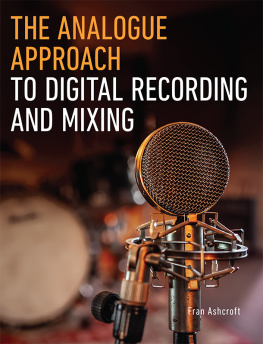
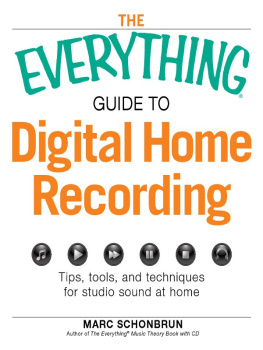

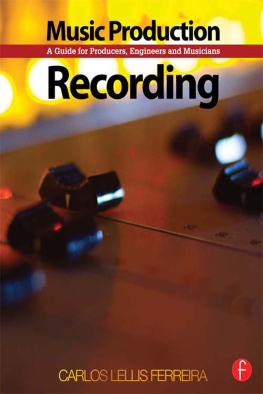
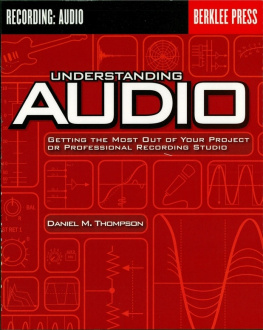
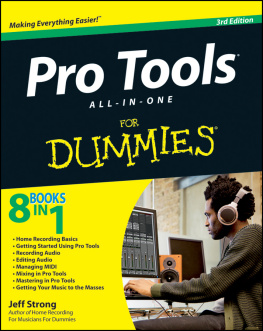
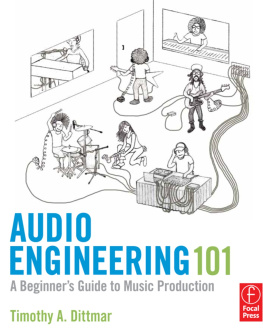
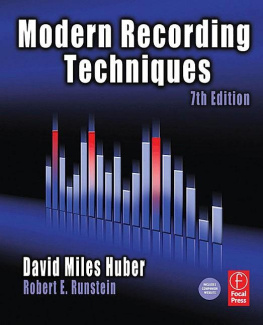
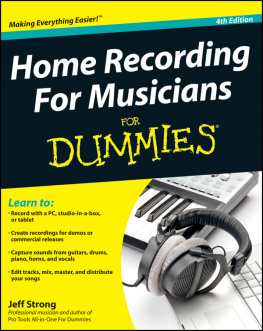


 ) are available online at www.oup.com/us/recordingonabudget
) are available online at www.oup.com/us/recordingonabudget